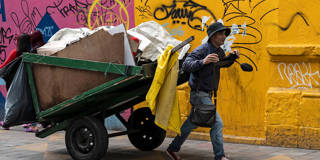Our economies rely on the collective well-being of two billion informal workers, many of whom are struggling with debt and rising health costs. To achieve an equitable and sustainable global recovery, policymakers must reject policies that overwhelmingly benefit only those at the top of the economic pyramid.
WASHINGTON, DC – When Edmundo, a waste picker in Peru, caught COVID-19, he had to take out a bank loan to pay for his visit to the clinic. Many of his colleagues also fell ill and subsequently went into debt, desperately seeking loans, emptying their savings, and selling their land and belongings to pay for clinical care and prescription drugs.
Informal workers like Edmundo (his name has been changed in the interest of privacy) – or recicladores, as they are known in Latin America – provide an essential public service by recycling solid waste in urban localities. From New York City to Bangkok, they contribute to their local and national economies, improve public health, and promote environmental sustainability.
But while informal workers like these waste pickers comprise the majority of the global workforce, they have no health insurance, pensions, or any form of social protection. Over the past few years, many have seen their incomes wiped out by COVID-19 lockdowns and associated supply-chain disruptions and inflationary pressures. Many are struggling financially and face constant threats to their health, safety, and livelihoods.

WASHINGTON, DC – When Edmundo, a waste picker in Peru, caught COVID-19, he had to take out a bank loan to pay for his visit to the clinic. Many of his colleagues also fell ill and subsequently went into debt, desperately seeking loans, emptying their savings, and selling their land and belongings to pay for clinical care and prescription drugs.
Informal workers like Edmundo (his name has been changed in the interest of privacy) – or recicladores, as they are known in Latin America – provide an essential public service by recycling solid waste in urban localities. From New York City to Bangkok, they contribute to their local and national economies, improve public health, and promote environmental sustainability.
But while informal workers like these waste pickers comprise the majority of the global workforce, they have no health insurance, pensions, or any form of social protection. Over the past few years, many have seen their incomes wiped out by COVID-19 lockdowns and associated supply-chain disruptions and inflationary pressures. Many are struggling financially and face constant threats to their health, safety, and livelihoods.